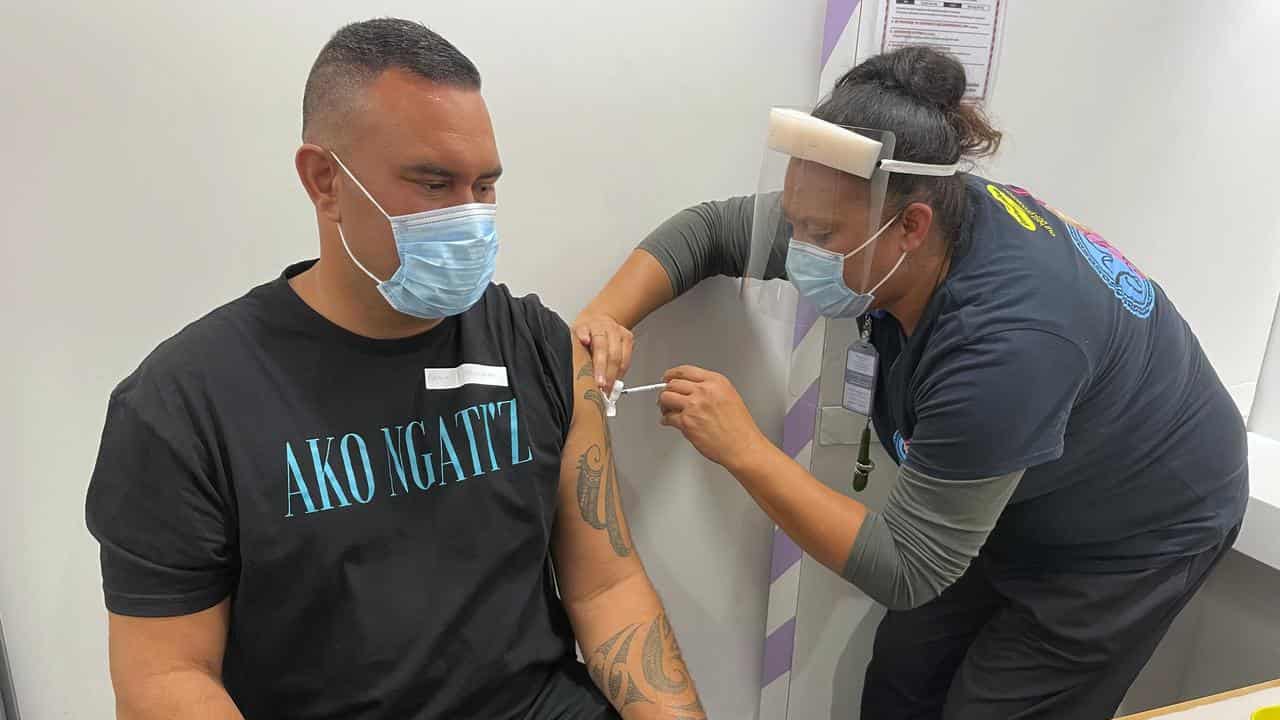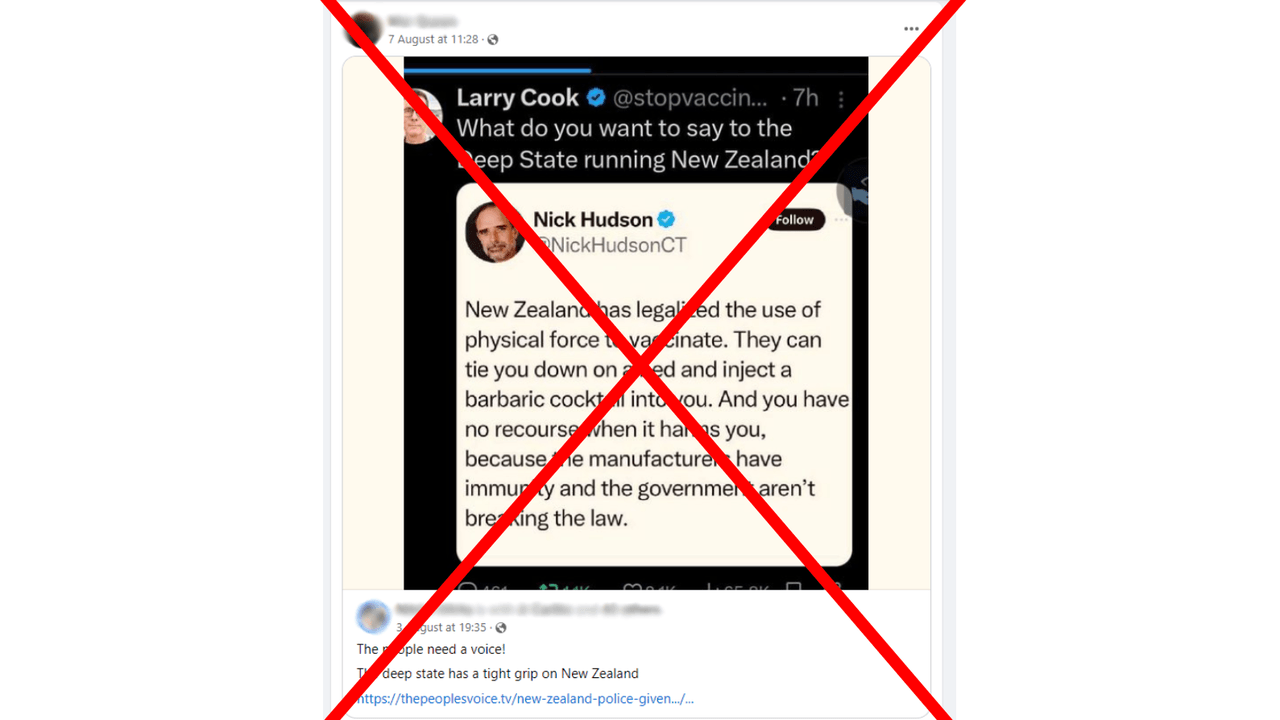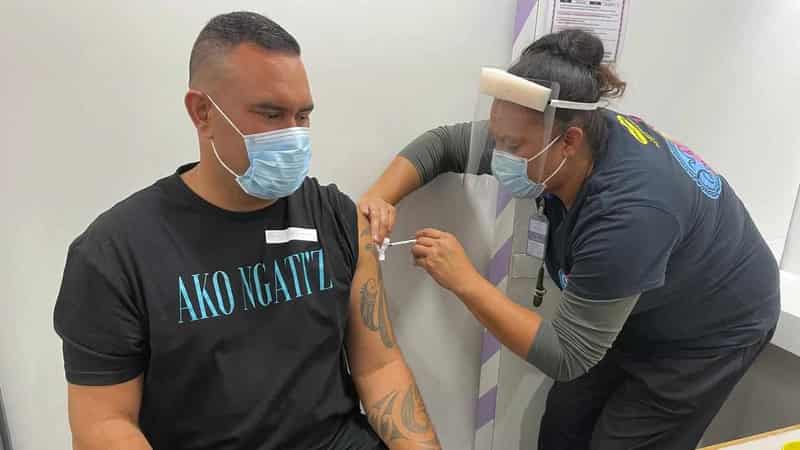
What was claimed
New Zealand’s Pandemic Plan gives police power to restrain citizens for forced vaccination.
Our verdict
False. NZ's Bill of Rights Act prevents any forced medical procedure.
AAP FACTCHECK - New Zealand police have been given the power to restrain citizens for forced vaccinations under a new pandemic plan, viral social media posts claim.
This is false. Legal experts say there’s no law in NZ that gives police or anyone else the power to enforce any medical procedure, including vaccinations, and that doing so would contravene the country's Bill of Rights Act.
Multiple Facebook posts make the claim, including one that shares a screenshot of an X post that reads: "New Zealand has legalized the use of physical force to vaccinate”.
It continues: “They can tie you down on a bed and inject a barbaric cocktail into you. And you have no recourse when it harms you, because the manufacturers have immunity and the government aren't breaking the law."
Like other posts, it shares a link to an article headlined "New Zealand Police given power to restrain citizens for forced vaccinations under new 'Pandemic Plan’”.
It’s published by The People's Voice, a site that has been checked multiple times by AAP FactCheck.

The article refers to "special powers" included in the NZ government’s Pandemic Plan, which was updated in July 2024 and sets out the country's strategy for preparing for and responding to future pandemics.
The section concerning "special powers" (p125) outlines the scope of the powers that are granted within section 70 of the NZ Health Act 1956.
They include the power to require people to be isolated, quarantined or disinfected, "until they have undergone such preventive treatment as the medical officer of health prescribes".
This section of the plan also refers to section 71A of the act, which it says gives police the power to "do anything reasonably necessary (including the use of force) to help a medical officer of health" exercise their powers under sections 70 or 71 of the act.
This is the part of the plan that has fuelled reaction online.
But neither the Pandemic Plan’s section on special powers, nor sections 70 and 71 in the Health Act, mention forced vaccinations.
However, section 11 of the NZ Bill of Rights Act states that “everyone has the right to refuse to undergo any medical treatment".
Forcing someone to take any treatment, including vaccines, would contravene this right.

Professor of law at the University of Canterbury, John Hopkins, said there were no powers for the police to restrain people for vaccination or to force people to undergo medical procedures of any kind in NZ.
"Such powers are contrary to the New Zealand Bill of Rights Act (s11) and while [the act] can be overridden by a specific statute this would be very unlikely to occur,” Prof Hopkins told AAP FactCheck.
“Such powers certainly couldn’t exist in a pandemic plan which is not a legal document. It’s a strategy document to guide planning and response."
Prof Hopkins said it was important to distinguish between the ability to force someone to undertake medical treatment, and the consequences that might occur if they refuse to undertake that treatment.
The former is not permitted under NZ law. But the latter can be, if the consequences are proportionate, such as prolonged isolation.
Associate Professor of law at the University of Auckland, Hanna Wilberg, told AAP FactCheck that “during the Covid pandemic, [NZ] required certain professions to be vaccinated, but the element of compulsion was that they might not be able to work in that profession if they did not comply.
“There was never any suggestion of physically forced vaccinations.”
Prof Wilberg said that if forced vaccinations were ever planned this would have to be provided by law, not just a pandemic plan.
She said if that was ever the case, NZ courts would “almost certainly” find forced vaccinations to be an “unjustified limit on the right to refuse medical treatment”.
“On that basis, if it was in secondary legislation they would find it unlawful. If it was in an Act of Parliament they would try to read it some other way so as not to authorise forced vaccinations, and otherwise would declare the Act to be inconsistent with the Bill of Rights.”
The Verdict
False — The claim is inaccurate.
AAP FactCheck is an accredited member of the International Fact-Checking Network. To keep up with our latest fact checks, follow us on Facebook, Twitter and Instagram.









